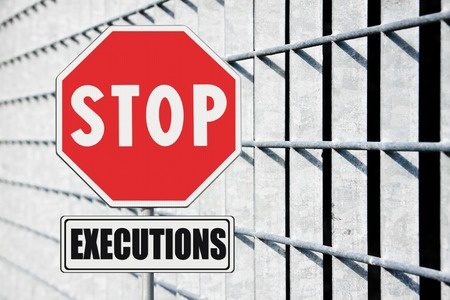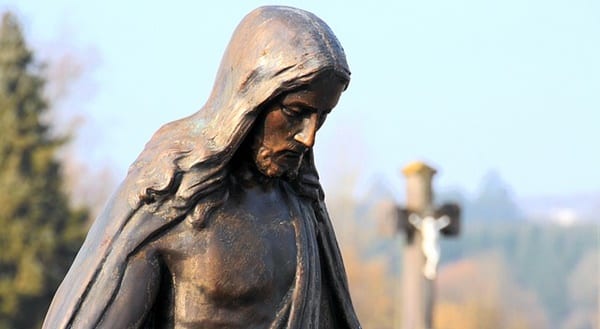
Kelly was on my mind Tuesday night as I fell asleep. I woke up yesterday devastated to learn that none of her appeals had saved her life. While hope resurfaced when the execution of Richard Glossip was stayed for 37 days, I still pray, knowing that only his method of execution, not his possible innocence, is being considered. I pray for Alfredo Prieto, who may die today despite arguments that he is intellectually disabled. And with a full and heavy heart, I also pray for Kimber Edwards, scheduled to die later this week for a crime of which he may also be innocent.
The death penalty must be abolished. Period. I am furious that no concern is shown for the possibility of innocence. I am disheartened that indefinite imprisonment with treatment is not considered sufficient for someone mentally ill. I am devastated that no mercy is shown to the contrite and repentant. But I also want the death penalty gone for those who are intellectually competent, remorseless, and guilty. It is a crime and an abomination. Far from deterring evil, it produces and perpetuates evil. There is no place for it in the world that Jesus Christ is rebuilding on a foundation of love.
While arguments will always be made for and against the death penalty’s deterrence of murder, I believe that the greatest deterrence of murder, and the greatest testimony to the worth of every human life, is the abolition of the death penalty in all of its forms. Faith tells me this. The science of mimetic theory tells me this. And my aching for peace compels me to strive, against all of my pressing doubts, for a world that operates on compassion.
No one is born a murderer. Murderers are formed in a world of violence. They develop in an interconnected web of life that links them with all of us, and the violence they wield takes root in a society that, despite its protests to the contrary, makes it clear every day that it does not consider all life sacred.
No human being has the right to judge any life irredeemable. All of our hands are bloody. This is what Jesus taught us by his life, death, and resurrection: that we are all entangled in a sacrificial system dependent on victims and enemies, a system that will devour us all if we continue on the trajectory of vengeance and retribution. The only way out is forgiveness. Put to death by religious and government authorities, Jesus exposed our wrath and our fear, but also the depths to which Love will go to heal us and save us from this hell of our own making. Jesus is not our only victim; rather, he became our victim to show us what we do to all of our victims. His resurrection ripped a hole in the foundation of the world built on violence, exposing it as the graveyard of the victims who upheld civilization by their deaths. Those who argue in favor of the death penalty say that it keeps the balance of justice in tact, but Jesus forever disrupted that balance (which was never as stable as we would like to believe) when we killed the innocent and he pardoned the guilty. We all spilled his blood, and the blood of so many others, and we have all been forgiven. At least for those who profess Christ, as do so many in Georgia, Oklahoma, Virginia, Missouri, and throughout the nation, there is a clear mandate to forgive as we have been forgiven.
When there is so much for which we must be forgiven, we cannot rely on our terribly imperfect judgment, or the judgment of the state, when it comes to deeming someone else unforgivable. We need so much mercy because we are apt to be so wrong so often. We live on land stolen from its native inhabitants. The American economy was built on torturous slave labor. Racism and sexism and homophobia destroy lives. Our tax dollars fund the largest killing machine in the world. We often hurt people even when we have the best of intentions, and we can all name a time we have hurt someone deliberately. We are desperate for mercy. Forgiveness and reconciliation are as crucial to life as the very air we breathe.
What does this have to do with the death penalty? Jesus equates anger with murder. We know that to varying degrees we have participated in acts that have diminished life. We know that we play active roles in systems that destroy life. We are guilty of the murder of Jesus not simply through direct acts of killing, but through infinite small cuts of cruelty, dehumanization, and indifference. These small acts together build systems of selfishness and sacrifice that keep the world running right over its victims. None of us are without sin, and none of us have the moral authority to cast stones.
The death penalty, like any other murder, is the product of a violent world. It is the contagion of vengeance enshrined in law. It is judgment pronounced by a state blind to its own need for mercy. And when we are blind to our own need for mercy, we are also blind to the harm we do to others. When we fail to show mercy, we fail to be transformed by the mercy available to us. The death penalty perpetuates violence by eroding the souls of those who enforce and execute it, deepening the morass of cruelty that consumes us.
The only cure to the contagion of violence is mercy. Abolition of the death penalty is an act of mercy that overpowers violence. It makes a clear declaration that no evil is strong enough to overshadow the image of God implanted within each of us. What stronger way could there be to rebuke death than with affirmation of life?
Abolition of the death penalty cannot be confined to the criminal justice system. People are condemned to death by war and diversion of resources, by apathy and greed. We must cease all killing, by abolishing the death penalty and war replacing them with methods of conflict resolution that aim to respect human dignity above all. And we must reinforce human dignity by reorienting our policy goals from concentration of wealth and power toward distribution of resources and services. Such a reorientation could not be confined to our policies but must take root in our hearts and transform our actions. Just as moment to moment acts of cruelty build systems of sacrifice, moment to moment acts of empathy build systems of compassion. We must continue to turn from instincts that return violence for violence and follow the one who met cruelty with forgiveness, pain with healing, hate with love. With every such act of mercy and kindness, we build up life for others and immerse ourselves deeper into the abundant life we receive in Jesus.
Building up life, building up a world of mercy, building up the kingdom of God, is the best way to deter the violent crimes that the death penalty can only compound. The best way to honor the victims of violent crime is to help build a world in which no one else will be victimized. Those who kill are in need of healing, not death. We have already received the answer to death when Jesus poured upon us an abundance of mercy and love. To spread this healing to a violent world desperate for grace, we must go and do likewise.











